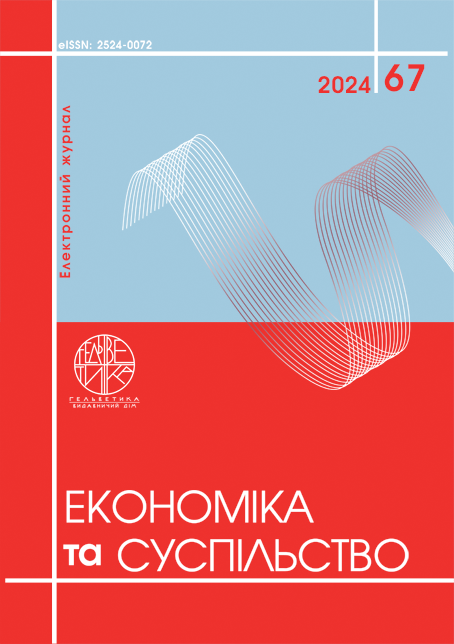ENSURING SOCIAL RESPONSIBILITY OF THE HOSPITALITY INDUSTRY THROUGH THE PRISM OF IMPACT INVESTING
Abstract
The article is devoted to the study of the peculiarities of ensuring social responsibility of the hospitality industry through the prism of impact investing. The results of the study outline the key role of impact investing policy in promoting regional economic development and improving the environment. Against the backdrop of the post-pandemic revival of the hospitality industry, the integration of impact investing is becoming vital for both developing and developed countries. Given the global environmental crisis, the study highlights the need for effective mechanisms of international cooperation to address environmental issues, positioning impact investing as a catalyst for achieving sustainable economic development goals, promoting environmentally friendly practices and addressing global environmental imperatives. The study also found that impact investing policy plays a crucial role for countries in terms of regional economic development and environmental improvement. Urgent global environmental challenges, such as global warming and energy shortages, necessitate the search for effective measures that have a positive impact on public policy making. The primary objective of such policies is to promote human capital development and ensure the long-term implementation of strategic goals. This is particularly important for countries with high potential for tourism development, as tourism and hospitality are closely linked. The hospitality industry catalyses tourism recovery and offers opportunities for impact investing. Impact investing in this sector can contribute to its growth and improve sustainable economic development policy practices. In 2022, energy shortages and energy dependence have become critical issues for many countries. This has created a need to explore alternative sources of renewable energy and develop new product markets to stimulate the development of the energy market. The hospitality industry, which has experienced a recovery from the negative effects of the COVID-19 pandemic, has significant potential for growth. Therefore, social investment in the hospitality sector is becoming crucial for both developing and developed countries. Given the current global environmental crisis, effective mechanisms for international cooperation are essential to addressing environmental challenges. Impact investing contributes to the achievement of sustainable economic development goals, promotes environmentally friendly practices, and helps to address the global environmental situation. It is important to recognise the limitations of this study. The findings of the study cannot be universally applied, as the impact of investments can vary significantly depending on regional and sectoral differences in the hospitality industry. Therefore, future research should focus on specific regions or countries to identify regional differences and nuances in the impact of impact investments.
References
Ban Q. (2023). The Quality of Corporate Social Responsibility Information Disclosure and Enterprise Innovation: Evidence from Chinese Listed Companies. Sustainability. 15(1):238.
Barman, E. (2015). Of principle and principal: Value plurality in the market of impact investing. Journal of Valuation Studies, 3(1), 9–44. DOI: https://doi.org/10.3384/VS.2001-5592.15319
Bonnici, F., & Raja, P. (2020). 6 ways social innovators are responding to the COVID-19 pandemic by Commissioner. World Economic Forum, 1–12.
Brandstetter, L., & Lehner, O.M. (2015). Opening the market for impact investments: The need for adapted portfolio tools. Entrepreneurship Research Journal, 5(2), 87–07. DOI: https://doi.org/10.1515/erj-2015-0003
Chang, D.-S.; Wu, W.-D. (2021). Impact of the COVID-19 Pandemic on the Tourism Industry: Applying TRIZ and DEMATEL to Construct a Decision-Making Model. Sustainability, 13, 7610. DOI: https://doi.org/10.3390/su13147610
Clarkin, J.E., & Cangioni, C.L. (2016). Impact investing: A primer and review of the literature. Journal of Entrepreneurship Research, 6(2), 135–173. DOI: https://doi.org/10.1515/erj-2014-0011
Henseler, M., Maisonnave, H., Maskaeva, A. (2022). Economic impacts of COVID-19 on the tourism sector in Tanzania, Annals of Tourism Research Empirical Insights, Volume 3, Issue 1. DOI: https://doi.org/10.1016/j.annale.2022.100042
Höchstädter, A.K., & Scheck, B. (2015). What’s in a name: An analysis of impact investing understandings by academics and practitioners. Journal of Business Ethics, 132(2), 449–475. DOI: https://doi.org/10.1007/s10551-014-2327-0
Johnson, V. L., Kiser, A., Washington, R., & Torres, R. (2018). Limitations to the rapid adoption of M-payment services: Understanding the impact of privacy risk on M-Payment services. Computers in Human Behavior, 79, 111–122. DOI: https://doi.org/10.1016/j.chb.2017.10.035
Lyon, F., & Owen, R. (2019). Financing social enterprises and the demand for social investment. Strategic Change, 28(1), 47–57. DOI: https://doi.org/10.1002/jsc.2245
Mogapi, E.M., Sutherland, M.M., & Wilson Prangley, A. (2019). Impact investing in South Africa: Managing tensions between financial returns and social impact. European Business Review, 31(3), 397–419. DOI: https://doi.org/10.1108/EBR-11-2017-0212
Mudaliar, A., Bass, R., Dietrich, H., & Nova, N. (2019). Annual impact investor survey. Global Impact Investing Network.
Ormiston, J., Charlton, K., Donald, M.S., & Seymour, R.G. (2015). Overcoming the challenges of impact investing: Insights from leading investors. Journal of Social Entrepreneurship, 6(3), 1–27. DOI: https://doi.org/10.1080/19420676.2015.1049285
Phillips, S. D., & Johnson, B. (2019). Inching to Impact: The Demand Side of Social Impact Investing. Journal of Business Ethics, 0123456789. DOI: https://doi.org/10.1007/s10551-019-04241-5
Piga, C.A., Abrate, G., Viglia, G. et al. (2022). How the hospitality industry reacts to COVID-19: structural, managerial and tactical factors. J Revenue Pricing Manag., 21, 503–516. DOI: https://doi.org/10.1057/s41272-021-00359-2
Revelli, C. (2017). Socially responsible investing (SRI): From mainstream to the margin? Research in International Business and Finance, 39(B), 711–717. DOI: https://doi.org/10.1016/j.ribaf.2015.11.003
Roundy, P. T. (2019). Regional differences in impact investment: a theory of impact investing ecosystems. Social Responsibility Journal, 16(4), 467–485. DOI: https://doi.org/10.1108/SRJ-11-2018-0302
Sales, T. (2015). Impact investment in Africa: Trends, constraints, and opportunities. United Nations Development Programme.
Urban, B., & George, J. (2018). An empirical study on measures relating to impact investing in South Africa. International Journal of Sustainable Economy, 10(1), 61–77. DOI: https://doi.org/10.1504/IJSE.2018.088622
Widyawati, L. (2020). A systematic literature review of socially responsible investment and environmental social governance metrics. Business Strategy and the Environment, 29(2), 619–637. DOI: https://doi.org/10.1002/bse.2393
Wood, D., Thornley, B., & Grace, K. (2013). Institutional impact investing: Practice and policy. Journal of Sustainable Finance and Investment, 3(2), 75–94. DOI: https://doi.org/10.1080/20430795.2013.776256
Yasar, B. (2021). The New Investment Landscape: Equity Crowdfunding. Central Bank Review. DOI: https://doi.org/10.1016/j.cbrev.2021.01.001
Yılmaz, I. S., & Yaşar, B. (2021). Crowdfunding as a Financial Tool for Social Enterprises. In Creating Social Value Through Social Entrepreneurship (pp. 135–157). IGI Global. DOI: https://doi.org/10.4018/978-1-7998-4727-4.ch008

This work is licensed under a Creative Commons Attribution 4.0 International License.


